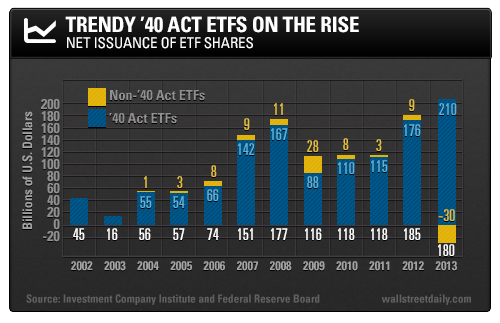Exchange-traded funds (ETFs) are still hot investments.
It seems a new ETF pops up almost daily.
The total number of ETFs offered by the end of 2013 reached 1,294 and represented $1.675 trillion in assets under management. That’s up from a mere 113 in 2002.
And now some investors are using a lucrative trick to get rich with their ETF – a tax loophole.
But you can’t use just any ETF to take advantage of this loophole.
Investors need to take a page from the hipster handbook and go vintage… back to the 1940s.
Going Vintage
So, here’s the deal with commodity ETFs.
Typical ETFs holding commodity futures are structured as “commodity pools,” which require a K-1 Partnership Income form.
Thus, you have to hassle with a K-1 at the end of the year, and you get taxed on futures contracts.
So on an up year, you can pay taxes despite having received no income and not having closed out your positions – not good for your bottom line.
But if an ETF is structured according to the Investment Company Act of 1940, it eliminates the need for the dreaded Schedule K-1 tax reporting.
That’s why ‘40 Act funds are hotter than a plaid shirt and skinny jeans lately.

Unfortunately, ‘40 Act-structured funds still have to pay taxes on futures contracts.
But now there’s a fresh new commodity ETF in town that gets around both of these tax issues.
The New Hotness
On October 16, BlackRock (NYSE:BLK) introduced a new iShares Commodities Select Strategy ETF (COMT). And it’s drawing a lot of attention.
COMT is being touted as unique to the marketplace. Why?
Because the $4.525-trillion asset manager (as of September 30), is the first ETF to provide long-only broad exposure to commodities in a ‘40 Act-regulated structure without needing to pay taxes on futures.
You see, COMT’s futures contracts are held in a tax-free, wholly owned subsidiary in the Cayman Islands, meaning the futures contracts are essentially off the books.
This means you won’t owe taxes on implied gains, and any gains booked from the fund will be distributed to you as ordinary income.
On top of that, distributions from COMT’s net investment income are taxable to the investor as ordinary income.
Advantages and Risks of Being on Trend
In addition to the tax benefit, there are a few other advantages to investing in COMT.
First, it employs an active management approach, which should theoretically outperform that of a passive commodity index such as the iShares GSCI Commodity-Indexed (ARCA:GSG).
Secondly, COMT’s futures roll methodology aims to reduce the negative impact of the contango. Instead, COMT seeks to benefit from backwardation when future prices are lower than the current prices.
The fund is also diverse. COMT not only invests in futures, swaps, and option contracts on 22 commodities, but a portion of its assets will also be allocated to the stocks of commodity-related companies, which is approximately 35% of the fund’s assets at inception.
There are, however, inherent risks in this structure.
The IRS or the Securities and Exchange Commission could close this loophole with new regulations. And there’s always the risk that the Cayman Islands will reverse its tax-free status.
Finally, you should always keep in mind that commodities futures and commodity-producing companies tend to be positively correlated.
With a long only fund, if the commodity price falls, the equity will likely come down with it.
Good investing,
